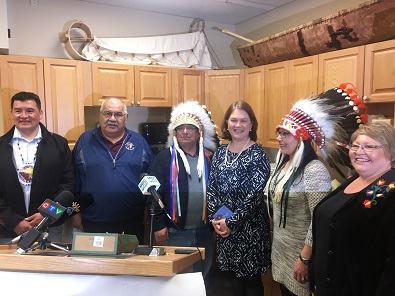Federal Health Minister Jane Philpott meets with officials in La Ronge. Photo courtesy of Abel Charles.
Federal Health Minister Jane Philpott says the government recognizes the scope and the seriousness of the mental health issues that are facing First Nations communities.
She says she has also heard loud and clear that community driven solutions are key to enhancing the mental, physical and spiritual health of communities.
To that end, she announced $1.2 million in federal funding to support mental wellness teams in the communities of the Lac La Ronge Indian Band and the Peter Ballantyne Cree Nation. She made the announcement in La Ronge over the noon hour. Philpott says it is part of a federal commitment to First Nations communities.
“We are committed to working nation-to-nation with First Nations leaders and support their efforts to foster hope among their youth, their families and their communities,” she said.
Over the past year, Health Canada has doubled the amount of mental wellness teams in Saskatchewan to 10. Each team adopts an integrated approach blending traditional, cultural and mainstream clinical approaches for the care and aftercare of patients.
Lac La Ronge Indian Band Chief Tammy Cook-Searson welcomes the additional funding.
“However, the trauma does run deep and we know there is much more work to be done,” she said. “This will enhance the services we have already because we have prevention recovery teams in our communities. The new funding will help us as we will share the resources with other communities like La Ronge, Air Ronge, Pinehouse and the hamlet of Stanley Mission.”
But Cook-Searson says she will continue her push for a healing and wellness centre.
“We look forward to continuing our discussions with the federal government to advance our plans for a wholistic wellness centre that can have lasting change for this generation and those to come,” she said.
The chief of the Peter Ballantyne Cree Nation, Peter Beatty, also welcomes the additional support, but says long-term strategies are still needed.
“Although this is a positive first step toward acknowledging and addressing the needs of our northern First Nations, we hope to continue discussion on long-term strategies,” he said.
Beatty also believes a return to traditional livelihoods will play an important role in addressing mental health needs.
“There is one component that is missing and that is the traditional approach to healing,” he said. “We need to go back to that way of life and have to teach our young people. Healing on the land is an important component that we have to focus on. I was brought up in that way — on the trapline, hunting, fishing — and we never heard of mental health problems in our communities.”
In last month’s federal budget, the government pledged $828 million over five years to improve Indigenous health, including nearly $120 million for community driven mental health programming.
